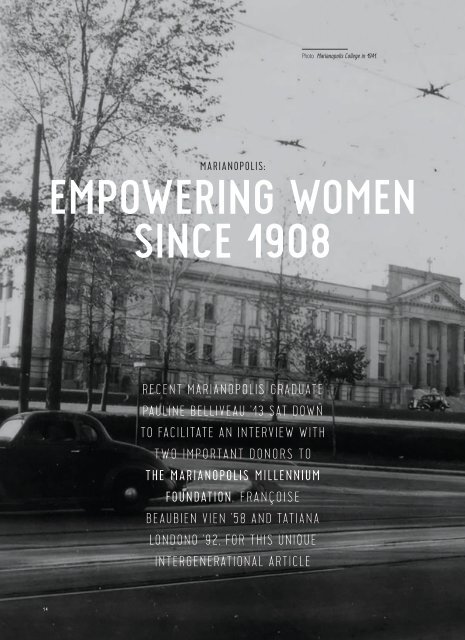Marianopolis-Matters-fall-2014
Marianopolis-Matters-fall-2014
Marianopolis-Matters-fall-2014
You also want an ePaper? Increase the reach of your titles
YUMPU automatically turns print PDFs into web optimized ePapers that Google loves.
Photo: <strong>Marianopolis</strong> College in 1941.<br />
photo: Pauline Belliveau<br />
PAULINE<br />
Grad year: 2013<br />
Campus:<br />
Westmount Ave.<br />
MARIANOPOLIS:<br />
EMPOWERING WOMEN<br />
SINCE 1908<br />
Type of degree: DEC<br />
Program of study: Health Science<br />
Occupation:<br />
Student (also working at <strong>Marianopolis</strong>)<br />
RECENT MARIANOPOLIS GRADUATE<br />
PAULINE BELLIVEAU ’13 SAT DOWN<br />
TO FACILITATE AN INTERVIEW WITH<br />
TWO IMPORTANT DONORS TO<br />
THE MARIANOPOLIS MILLENNIUM<br />
FOUNDATION, FRANÇOISE<br />
BEAUBIEN VIEN ’58 AND TATIANA<br />
LONDONO ’92, FOR THIS UNIQUE<br />
INTERGENERATIONAL ARTICLE<br />
Pauline: What made you choose<br />
the College then In one phrase,<br />
how would you now describe your<br />
experience<br />
Françoise: A quest for knowledge, a desire to continue<br />
with academics beyond high school. “Satisfying<br />
revelation”.<br />
Tatiana: Growing up, my father told me I had to<br />
be different to succeed. The difference would<br />
sometimes make things hard, but would lead to a<br />
bright future. In high school most other students<br />
were Italian and came from families that expected<br />
them to take over family businesses; college would<br />
have been the exception rather than the norm. They<br />
would have had to pay for it on their own. My friend<br />
told me that she wanted to go to <strong>Marianopolis</strong>. I had<br />
not heard of it; my friend told me it was private, that<br />
you had to pay, and that it was exclusive. I was doing<br />
very well in school, and was following my father’s<br />
advice. I looked into <strong>Marianopolis</strong>. Only a handful of<br />
other people were going there, but I embraced the<br />
difference and begged my father to send me there.<br />
Despite the financial difficulty, my parents agreed<br />
that I should go. The summer before, I worked incredibly<br />
hard to have enough money to buy what I<br />
needed. When I arrived, I felt I wasn’t different anymore<br />
– not a nerd, not isolated. I fit in for the first<br />
time. I was finally amongst my own kind of people:<br />
different cultures, religions and personalities. “Fabulous”.<br />
“Solid foundation”.<br />
P: What advice would you give<br />
teenage [Tatiana/Françoise] if you<br />
could go back and talk to her on<br />
her first day at <strong>Marianopolis</strong><br />
F: Be open-minded; be very respectful of superiors<br />
and peers. Be confident and ask questions, never<br />
stop researching, but trust yourself. It’s so important<br />
to learn from other people’s perspectives, but also<br />
just to enjoy the good times. It is hard work but<br />
should be enjoyed.<br />
T: You go get ’em girl! Go make lots of friends. Go<br />
meet everybody. The more connections the better,<br />
and you keep them years later. So many successful,<br />
interesting people have come out of <strong>Marianopolis</strong>.<br />
P: Which experience at the College sticks<br />
out most in your memories, and why<br />
F: Generally, the novelty of each course; in high<br />
school there was one room, and one teacher. At<br />
<strong>Marianopolis</strong> you had more independence with a<br />
different teacher for each class. Specifically, you<br />
got to know people very well. When you were<br />
in your Junior year you had to work hard and<br />
prepare a very special ceremony for the Seniors who<br />
were graduating: you were assigned a student to<br />
imitate. It rang a bell to say ‘I’m ¾ of the way through.<br />
Next year will be me.’ I’ll always remember who<br />
personified me. There was a camaraderie that was<br />
very special. Not only did we know the girls in our<br />
year, we knew the girls in all four years. It was an<br />
important passage into the real world. The respect<br />
that we had for each other, for those ahead of us, the<br />
faculty… respect is one of my favourite values at this<br />
age. If there was more respect in the world there<br />
would be less conflict.<br />
T: The coming into true adulthood. I really did feel<br />
like a grown-up finally. The teachers talked to you<br />
at a different level; you knew you had arrived. When<br />
you’re in high school they treat you like a baby, but<br />
once you walk into <strong>Marianopolis</strong> you feel like an<br />
adult. You feel the responsibility that your decisions<br />
will affect the rest of your life. Your future is in your<br />
hands; in high school you could still change your<br />
mind. At <strong>Marianopolis</strong> you have to be making the<br />
right decisions. The actual experience that stays<br />
in my mind was when Pierre Elliott Trudeau came<br />
to speak during Universal Period. I was one of the<br />
people chosen to hear him speak since only a limited<br />
group could fit in the Library. I knew I was<br />
amongst special people.<br />
F: We had René Lévesque. For International<br />
Relations he came in to talk. He smoked, and didn’t<br />
wear a tie! For a gentleman to come in without a tie<br />
was significant. He was a journalist at the time, not<br />
yet a politician.<br />
14<br />
MARIANOPOLIS MATTERS | FALL <strong>2014</strong> 15


